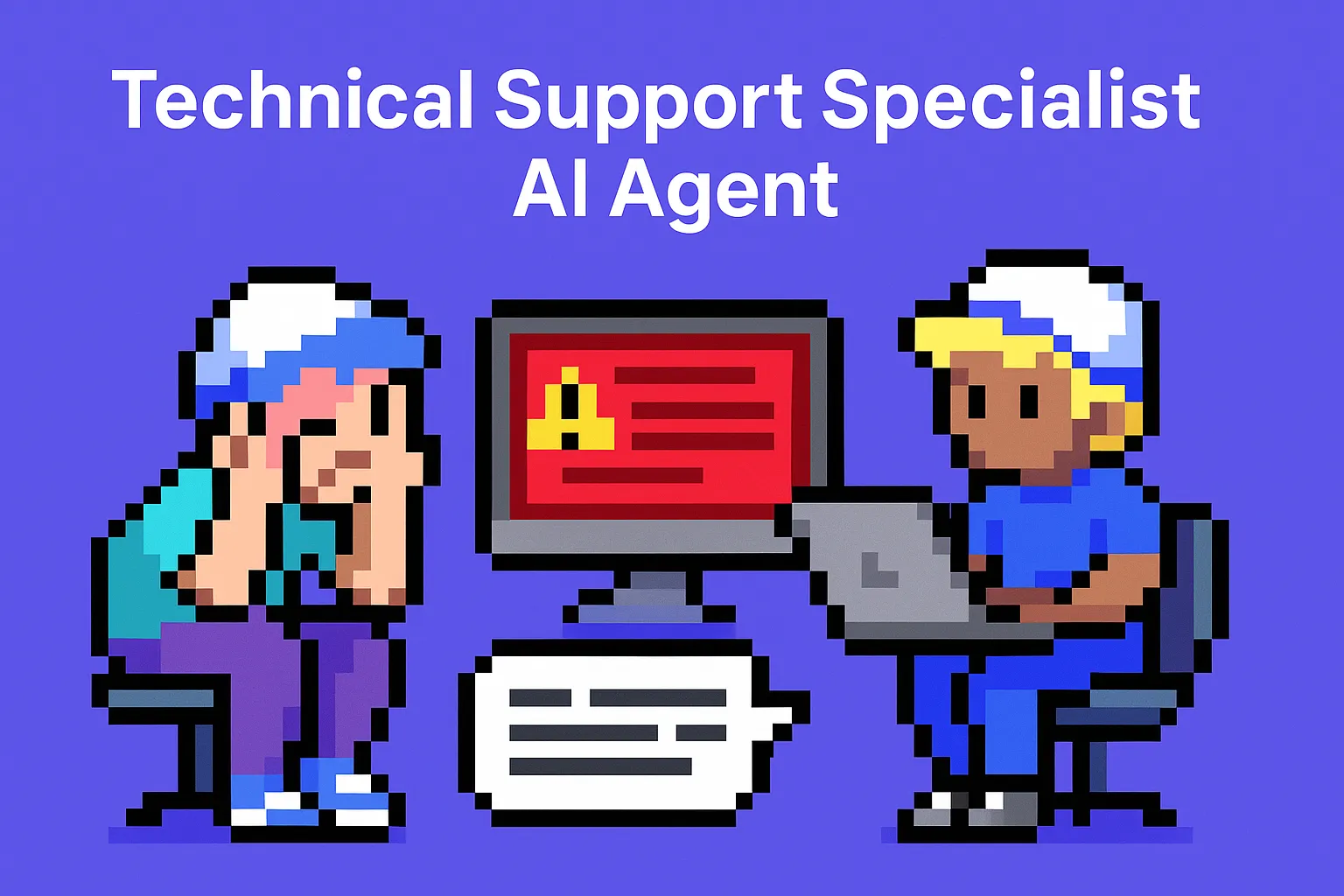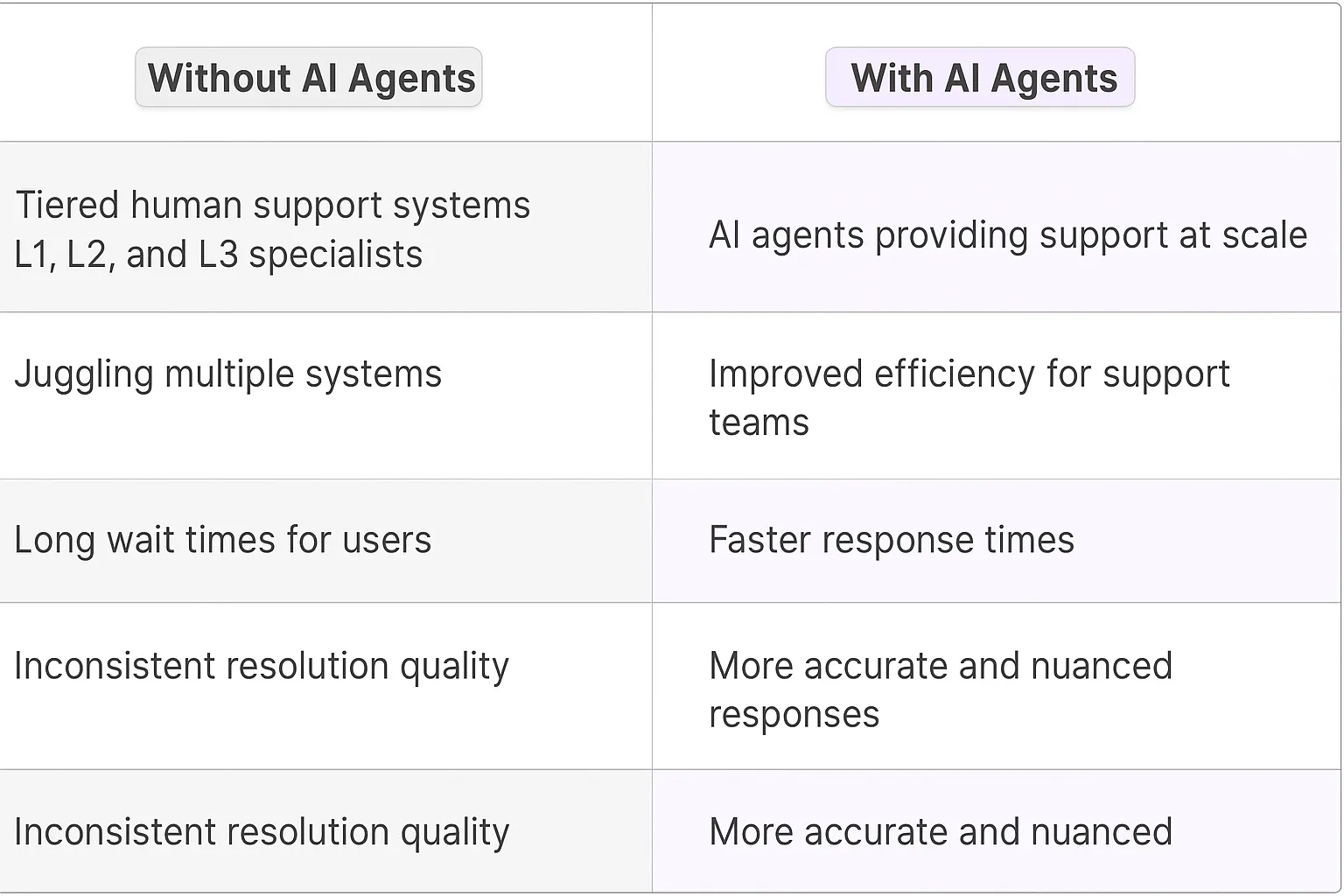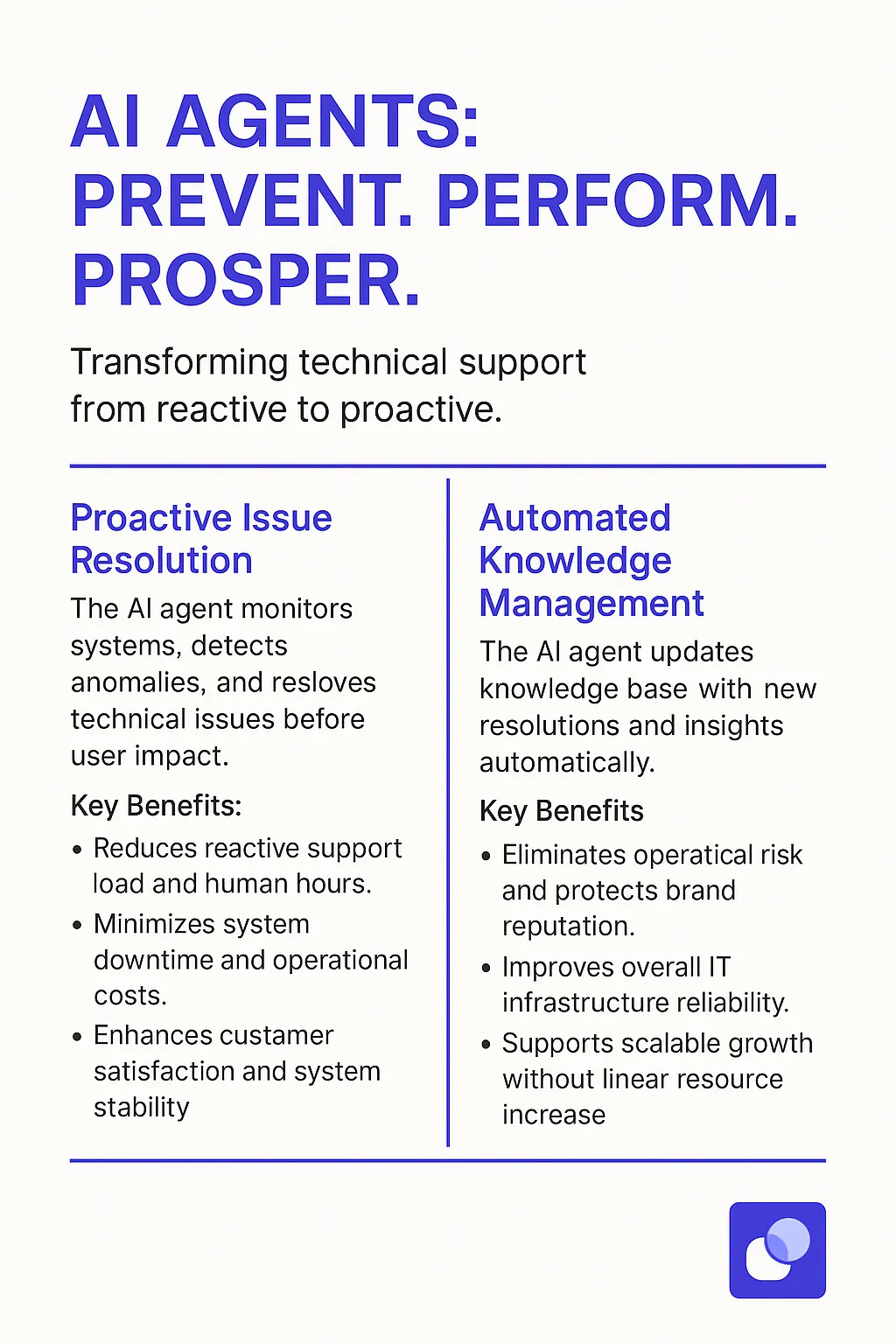A Technical Support Specialist AI Agent is a sophisticated digital teammate that combines deep technical expertise with advanced problem-solving capabilities. These AI-powered systems analyze technical issues, provide real-time troubleshooting, and learn continuously from each interaction. Unlike basic chatbots, they understand complex technical contexts and can navigate intricate system dependencies to deliver precise solutions.

Traditional tech support relied heavily on tiered human support systems - L1, L2, and L3 specialists handling everything from password resets to complex debugging. Support teams juggled multiple ticketing systems, knowledge bases, and documentation portals while trying to maintain response times. The reality was long wait times for users, burnout for support staff, and inconsistent resolution quality.
The integration of AI agents into technical support creates a powerful network effect. As more users interact with these digital teammates, the knowledge base expands exponentially, leading to increasingly accurate and nuanced responses. This represents a step-function improvement in technical support delivery.
Key advantages include:
The most compelling aspect is how AI agents augment human support teams rather than replace them. They handle routine queries and initial diagnostics, freeing technical specialists to focus on complex problem-solving and strategic improvements. This creates a multiplier effect on support team productivity while significantly improving the user experience.

Technical support teams face complex challenges daily, from debugging code to resolving system conflicts. AI agents trained in technical support bring a new dimension to problem-solving, working alongside human teams to tackle issues faster and more effectively.
When technical support teams integrate AI agents into their workflow, the transformation is profound but practical. Support specialists can focus on complex problem-solving while their digital teammates handle routine diagnostics and documentation. This isn't about replacing human expertise – it's about amplifying it.
The most successful technical support teams use AI agents as knowledge accelerators. They tap into vast databases of past solutions, identify patterns in system behaviors, and suggest fixes based on historical success rates. This approach reduces resolution times from hours to minutes for common issues.
Consider a software company's support team handling hundreds of daily tickets. Their AI agent analyzes incoming issues, immediately identifies known problems, and provides solutions from previous cases. For new issues, it gathers relevant system data and presents it to human specialists in a clear, actionable format.
The AI agent excels at correlating seemingly unrelated incidents, spotting emerging patterns that might indicate broader system issues. This predictive capability helps teams move from reactive support to proactive problem prevention.
Technical support AI agents are evolving to understand context beyond just technical specifications. They're learning to read between the lines of user reports, anticipate follow-up questions, and suggest solutions that consider both technical requirements and user capabilities.
As these digital teammates become more sophisticated, they'll take on increasingly complex diagnostic tasks, freeing human specialists to focus on innovation and relationship building with key clients.

Technical support AI agents are fundamentally changing how companies handle customer issues and maintain their tech infrastructure. The real power lies in their ability to adapt and scale across different technical support scenarios - from enterprise IT departments to consumer electronics manufacturers.
What makes these digital teammates particularly effective is their deep pattern recognition capabilities combined with natural problem-solving abilities. They can identify recurring technical issues, suggest proven solutions, and learn from each interaction to build an ever-growing knowledge base.
The most compelling aspect is how they're reshaping traditional support models. Rather than replacing human technicians, they're becoming invaluable partners that handle routine diagnostics and troubleshooting, allowing technical specialists to focus on complex problem-solving and strategic improvements.
This shift creates a fascinating dynamic where AI agents serve as both front-line support and knowledge amplifiers, making technical expertise more accessible while simultaneously raising the bar for what's possible in technical support operations.
The software development industry faces a unique challenge - supporting thousands of developers using complex frameworks, libraries, and tools. Traditional support models strain under the weight of repetitive debugging requests and configuration issues that slow down engineering velocity.
Technical Support AI Agents transform this dynamic by operating as specialized debugging partners within development environments. When integrated into platforms like GitHub or GitLab, these digital teammates analyze error logs, stack traces, and system configurations in milliseconds - identifying root causes that would take human support engineers significant time to diagnose.
A concrete example comes from a mid-sized SaaS company that embedded a Technical Support Agent into their developer portal. The agent gained deep knowledge of their microservices architecture, deployment processes, and common failure patterns. When developers hit issues, the agent could immediately:
The impact was dramatic - average time-to-resolution dropped from 2.4 hours to 18 minutes. More importantly, developers gained a reliable first line of support that helped them maintain flow state instead of context-switching to file tickets or wait for human support.
This isn't just about faster fixes - it's about fundamentally changing the developer experience. The AI agent accumulates tribal knowledge that typically lives in scattered Slack threads and wiki pages. It becomes a living repository of technical solutions, continuously learning from each interaction to provide increasingly sophisticated support.
The next evolution will likely see these agents proactively identify potential issues before they cause problems, shifting technical support from reactive to preventive. For engineering organizations looking to scale efficiently, this represents a step change in how we think about developer enablement.
Manufacturing environments present a fascinating challenge for technical support - they combine complex machinery, intricate processes, and significant downtime costs. When production lines experience issues, every minute counts. Traditional support models involving manual inspection and phone calls to specialists create costly delays.
Technical Support AI Agents are transforming this dynamic by operating as on-demand equipment specialists. Through integration with IoT sensors and machine control systems, these digital teammates analyze real-time performance data, vibration patterns, and historical maintenance records to diagnose issues with remarkable precision.
A compelling case study comes from a large automotive parts manufacturer who deployed a Technical Support Agent across their CNC machining operations. The agent developed comprehensive knowledge of their equipment specifications, common failure modes, and optimal operating parameters. When operators encountered problems, the agent could:
The results redefined their support model - average equipment downtime decreased from 4.7 hours to 37 minutes per incident. But the real magic happened in the knowledge capture. The AI agent began identifying subtle patterns in machine behavior that predicted failures before they occurred.
This shifts the entire paradigm of manufacturing support from reactive to predictive. The agent becomes a collective memory bank of every breakdown, every fix, and every optimization across the factory floor. It's like having your most experienced maintenance technician instantly available at every workstation, but with perfect recall and pattern recognition capabilities.
The next phase will likely see these agents coordinating across entire manufacturing networks, sharing insights and optimizations between facilities. For operations leaders focused on maximizing equipment effectiveness, this represents a fundamental evolution in how we approach technical support on the factory floor.
Building effective technical support AI agents requires navigating several complex technical hurdles. The knowledge base integration needs to be seamless yet comprehensive - we're talking about connecting multiple data sources while maintaining real-time accuracy. Many organizations struggle with fragmented documentation spread across wikis, ticketing systems, and tribal knowledge.
Natural language processing for technical queries presents another significant challenge. Technical support conversations often include product-specific terminology, error codes, and complex troubleshooting steps. Training models to accurately interpret these specialized languages while maintaining context across multi-turn conversations demands sophisticated ML architecture.
The human side of implementing technical support AI agents often proves more challenging than the technical aspects. Support teams may feel threatened by automation, leading to resistance or reduced morale. The key is positioning AI agents as tools that handle repetitive tasks while elevating human agents to focus on complex problem-solving.
Knowledge management becomes exponentially more critical with AI agents. Support teams need new processes for continuously updating and validating the knowledge base. Without proper maintenance, AI responses can become outdated or incorrect, potentially causing more problems than they solve.
Successful technical support AI requires deep integration with existing support infrastructure. The agent needs access to user context, product data, and support history to provide relevant assistance. This often means building custom connectors to legacy systems or modifying existing APIs to handle AI agent interactions.
Security and compliance requirements add another layer of complexity. AI agents must maintain strict data handling protocols, especially when dealing with sensitive customer information or proprietary technical details. Organizations need robust systems for audit trails and data access controls.
Traditional support metrics don't always translate well to AI agent performance. While metrics like time-to-resolution remain relevant, new KPIs are needed to measure AI effectiveness. This includes tracking successful query understanding, appropriate escalation rates, and customer satisfaction with AI interactions.
The challenge lies in developing meaningful metrics that account for both technical accuracy and user experience. Organizations must balance speed and efficiency against the quality and completeness of support provided.
Technical Support AI Agents mark a fundamental shift in how organizations approach technical problem-solving. The combination of instant response times, pattern recognition at scale, and continuous learning creates a new paradigm in support delivery. As these digital teammates evolve, they'll enable support teams to move from reactive troubleshooting to predictive problem prevention. The future of technical support lies in this powerful partnership between human expertise and AI capabilities, where each amplifies the other's strengths.